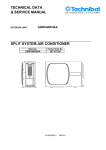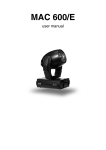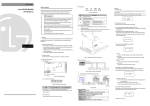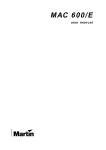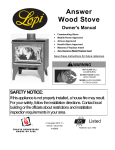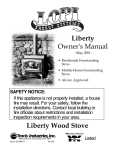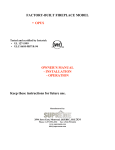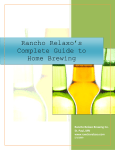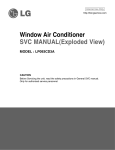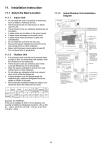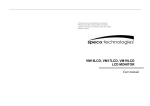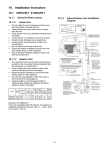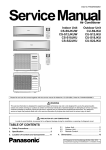Download Panasonic Air Conditioner - Philips Parts and Accessories
Transcript
Order No: MAC0512115C1 Air Conditioner CS-E18EKU CU-E18EKU CS-E21EKU CU-E21EKU CONTENTS Page Page 1 Safety Precautions 3 8 Printed Circuit Board 16 2 Specification 5 8.1. Indoor Unit 16 2.1. CS-E18EKU CU-E18EKU 5 8.2. Outdoor Unit 17 2.2. CS-E21EKU CU-E21EKU 7 9 Installation Instructions 18 3 Location of controls and components 9 9.1. Select The Best Location 18 3.1. Indoor Unit 9 9.2. Indoor Unit 19 3.2. Outdoor Unit 9 9.3. Outdoor Unit 23 3.3. Remote Control 9 10 Operation And Control 26 10 10.1. Basic Function 26 4.1. Indoor Unit & Remote Control 10 10.2. Protection Control 31 4.2. Outdoor Unit 11 4 Dimension 11 Servicing Mode 33 5 Refrigeration Cycle Diagram 12 11.1. Auto Switch Operation 33 6 Block Diagram 13 11.2. Indicator Panel 33 7 Wiring Diagram 14 7.1. CS-E18EKU CS-E21EKU 14 7.2. CU-E18EKU CU-E21EKU 15 12 Troubleshooting Guide 12.1. Refrigeration Cycle System 34 34 © 2005 Panasonic HA Air-Conditioning (M) Sdn Bhd (11969-T). All rights reserved. Unauthorized copying and distribution is a violation of law. CS-E18EKU CU-E18EKU / CS-E21EKU CU-E21EKU 12.2. Relationship Between The Condition Of The Air Conditioner And Pressure And Electric Current 14 Technical Data 44 35 14.1. CS-E18EKU CU-E18EKU 44 12.3. Breakdown Self Diagnosis Function 36 14.2. CS-E21EKU CU-E21EKU 52 12.4. Error Codes Table 37 13 Disassembly and Assembly Instructions 15 Exploded View And Replacement Parts List 60 38 15.1. CS-E18EKU CS-E21EKU 60 13.1. Indoor Electronic Controller and Control Board 38 15.2. CS-E18EKU CS-E21EKU 61 13.2. Indoor Cross Flow Fan and Fan Motor 41 15.3. CU-E18EKU CU-E21EKU 62 13.3. Outdoor Propeller Fan and Fan Motor 42 15.4. CU-E18EKU CU-E21EKU 63 2 CS-E18EKU CU-E18EKU / CS-E21EKU CU-E21EKU 1 Safety Precautions • Read the following “SAFETY PRECAUTIONS” carefully before perform any servicing. • Electrical work must be installed or serviced by a licensed electrician. Be sure to use the correct rating of the power plug and main circuit for the model installed. • The caution items stated here must be followed because these important contents are related to safety. The meaning of each indication used is as below. Incorrect installation or servicing due to ignoring of the instruction will cause harm or damage, and the seriousness is classified by the following indications. This indication shows the possibility of causing death or serious injury. This indication shows the possibility of causing injury or damage to properties. • The items to be followed are classified by the symbols: This symbol denotes item that is PROHIBITED from doing. • Carry out test running to confirm that no abnormality occurs after the servicing. Then, explain to user the operation, care and maintenance as stated in instructions. Please remind the customer to keep the operating instructions for future reference. 1. Engage dealer or specialist for installation and servicing. If installation or servicing done by the user is defective, it will cause water leakage, electrical shock or fire. 2. Install according to this installation instruction strictly. If installation is defective, it will cause water leakage, electrical shock or fire. 3. Use the attached accessories parts and specified parts for installation and servicing. Otherwise, it will cause the set to fall, water leakage, fire or electrical shock. 4. Install at a strong and firm location which is able to withstand the set’s weight. If the strength is not enough or installation is not properly done, the set will drop and cause injury. 5. For electrical work, follow the local national wiring standard, regulation and the installation instruction. An independent circuit and single outlet must be used. If electrical circuit capacity is not enough or defect found in electrical work, it will cause electrical shock or fire. 6. Use the specified cable and connect tightly for indoor/outdoor connection. Connect tightly and clamp the cable so that no external force will be acted on the terminal. If connection or fixing is not perfect, it will cause heat-up or fire at the connection. 7. Wire routing must be properly arranged so that control board cover is fixed properly. If control board cover is not fixed perfectly, it will cause heat-up at connection point of terminal, fire or electrical shock. 8. When connecting the piping, do not allow air or any substances other than the specified refrigerant to enter the refrigeration cycle. Otherwise, this may lower the capacity, cause abnormally high pressure in the refrigeration cycle, and possibly result in explosion and injury. 9. Thickness of copper pipes used must be more than 10/32 inches. Never use copper pipes thinner than 10/32 inches. 10. It is desirable that the amount of residual oil is less than 40 mg/10 m. 11. Do not modify the length of the power supply cord or use of the extension cord, and do not share the single outlet with other electrical appliances. Otherwise, it will cause fire or electrical shock. 3 CS-E18EKU CU-E18EKU / CS-E21EKU CU-E21EKU 1. The equipment must be earthed. It may cause electrical shock if grounding is not perfect. 2. Do not install the unit at place where leakage of flammable gas may occur. In case gas leaks and accumulates at surrounding of the unit, it may cause fire. 3. Carry out drainage piping as mentioned in installation instructions. If drainage is not perfect, water may enter the room and damage the furniture. 4. Pb free solder has a higher melting point than standard solder; typically the melting point is 50 - 70°F (30 - 40°C) higher. Please use a high temperature soldering iron. In case of the soldering iron with temperature control, please set it to 700 20°F (370 10°C). Pb free solder will tend to splash when heated too high (about 1100°F/600°C). 1. Selection of the installation location. Select an installation location which is rigid and strong enough to support or hold the unit, and select a location for easy maintenance. 2. Power supply connection to the air conditioner. Connect the power supply cord of the air conditioner to the mains using one of the following methods. Power supply point shall be the place where there is ease for access for the power disconnection in case of emergency. In some countries, permanent connection of this room air conditioner to the power supply is prohibited. 1. Power supply connection to the receptacle using a power plug. Use an approved power plug with earth pin for the connection to the socket. 2. Power supply connection to a circuit breaker for the permanent connection. Use an approved circuit breaker for the permanent connection. It must be a double pole switch with a minimum 4/32 inches contact gap. 3. Do not release refrigerant during piping work for installation, servicing, reinstallation and during repairing a refrigeration parts. Take care of the liquid refrigerant, it may cause frostbite. 4. Installation work. It may need two people to carry out the installation work. 5. Do not install this appliance in a laundry room or other location where water may drip from the ceiling, etc. 4 CS-E18EKU CU-E18EKU / CS-E21EKU CU-E21EKU 2 Specification 2.1. CS-E18EKU CU-E18EKU Unit CS-E18EKU CU-E18EKU Performance Test Condition CSA Cooling Capacity kW BTu/h 5.20 (1.30 - 5.80) 17,700 (4,400 - 19,700) Heating Capacity kW BTu/h 6.30 (1.30 - 7.70) 21,400 (4,400 - 19,700) Moisture Removal l/h Pint/h 1.8 3.8 ø V Hz Single 208 - 230 60 Power Source (Phase, Voltage, Cycle) Airflow Method OUTLET SIDE VIEW TOP VIEW INTAKE Air Volume Lo m3/min (cfm) Me m3/min (cfm) Hi m3/min (cfm) SHi m3/min (cfm) Cooling; Heating; Cooling; Heating; Cooling; Heating; 11.0 12.3 12.2 14.1 13.5 15.9 — (389) (443) (432) (497) (480) (560) — — Cooling; 40.0 (1,410) Heating; 40.0 (1,410) — dB (A) Cooling; High 45, Low 39 Heating; High 46, Low 39 Cooling; 47 - 47 Heating; 47 - 47 Power level dB Cooling; High 58 - 58 Heating; High 59 - 59 Cooling; High 60 - 60 Heating; High 60 - 60 Noise Level Electrical Data Input W Cooling; 1.60k (250 - 1.8k) Heating; 1.85k (250 - 2.50k) Running Current A Cooling; 7.9 Heating; 9.2 EER COP Starting Current W/W (kcal/hw) W/W (kcal/hw) A W/W inch inch inch inch inch inch Cooling; 3.25 (11.06) Heating; 3.41 (11.57) 9.2 SEER/HSPF Piping Connection Port (Flare piping) Pipe Size (Flare piping) Drain Inner diameter Hose Length 5 16.50 G ; Half Union 1/2” L ; Half Union 1/4” G (gas side) ; 1/2” L (liquid side) ; 1/4” 20/32” 25 - 19/32” 7.70 G ; 3-way valve 1/2” L ; 2-way valve 1/4” G (gas side) ; 1/2” L (liquid side) ; 1/4” — — CS-E18EKU CU-E18EKU / CS-E21EKU CU-E21EKU Unit inch Power Cord Length Number of core-wire Dimensions Height Width Depth Net Weight Compressor Motor Rated Fan Motor inch (mm) inch (mm) inch (mm) lb (kg) Type Type Output Type Material Type Input Rate Output Lo (Cool/Heat) Me (Cool/Heat) Hi (Cool/Heat) SHi (Cool/Heat) Motor Fan Speed Heat Exchanger CS-E18EKU CU-E18EKU 70 - 29/32” — (1.5mm2) — 10 - 13/16 (275) 29 - 17/32 (750) 39 - 9/32 (998) 34 - 7/16 (875) 9 - 1/16 (230) 13 - 19/32 (345) 24 (11.0) 108 (49.0) — Hermetic Motor — Brushless (4-pole) — 900 Cross-flow Fan Propeller Fan ASHT-18 P.P Transistor (8-poles) PWM (8-poles) 61.6 62.1 30 40 1,190/1,280 — 1,325/1,470 — 1,460/1,660 660/640 — — Evaporator Condenser Copper Copper Aluminium (Pre Coat) Aluminium (Blue Coat) Slit Fin Corrugated Fin (Plate fin configuration, forced draft) 2 / 15 2 / 34 21 16 2 - 1/32 × 1 - 13/32 × 1 1 - 14/32 × 19 - 27/32 × 33 - 2/32 34 - 2/32 — Capillary Tube — RB68A (24.4) — 930 (32.8) Electronic Control — — Electronic Control P.P. — Honeycomb W W W rpm rpm rpm rpm Description Tube material Fin material Fin Type Row / Stage FPI Size (W × H × L) Refrigerant Control Device Refrigeration Oil Refrigerant (R410A) Thermostat Protection Device Air Filter inch (inch3) g (oz) Material Style • Specifications are subjected to change without prior notice for further improvement. 6 CS-E18EKU CU-E18EKU / CS-E21EKU CU-E21EKU 2.2. CS-E21EKU CU-E21EKU Unit CS-E21EKU CU-E21EKU Performance Test Condition CSA Cooling Capacity kW BTu/h 6.10 (1.30 - 6.85) 20,800 (4,400 - 23,400) Heating Capacity kW BTu/h 6.90 (1.30 - 8.30) 23,400 (4,400 - 28,200) Moisture Removal l/h Pint/h 2.6 5.5 ø V Hz Single 208 - 230 60 Power Source (Phase, Voltage, Cycle) Airflow Method OUTLET SIDE VIEW TOP VIEW INTAKE Air Volume Lo m3/min (cfm) Me m3/min (cfm) Hi m3/min (cfm) SHi m3/min (cfm) Cooling; Heating; Cooling; Heating; Cooling; Heating; 11.4 12.6 13.1 14.5 14.7 16.5 — (404) (445) (462) (513) (520) (580) — — Cooling; 42.8 (1,510) Heating; 41.5 (1,460) — dB (A) Cooling; High 46, Low 39 Heating; High 47, Low 39 Cooling; 48 - 48 Heating; 49 - 49 Power level dB Cooling; High 59 Heating; High 60 Cooling; High 61 Heating; High 62 Noise Level Electrical Data Input W Cooling; 2.15k (250 - 2.45k) Heating; 2.15k (250 - 2.60k) Running Current A Cooling; 10.7 - 9.7 Heating; 10.7 - 9.7 EER COP Starting Current W/W (kcal/hw) W/W (kcal/hw) A W/W inch inch inch inch inch inch Cooling; 2.84 (9.67) Heating; 3.21 (10.88) 10.7 SEER/HSPF Piping Connection Port (Flare piping) Pipe Size (Flare piping) Drain Inner diameter Hose Length Power Cord Length Number of core-wire 7 16.50 G ; Half Union 1/2” L ; Half Union 1/4” G (gas side) ; 1/2” L (liquid side) ; 1/4” 20/32” 25 - 19/32” 70 - 29/32” (1.5mm2) 7.70 G ; 3-way valve 1/2” L ; 2-way valve 1/4” G (gas side) ; 1/2” L (liquid side) ; 1/4” — — — — CS-E18EKU CU-E18EKU / CS-E21EKU CU-E21EKU Dimensions Net Weight Compressor Motor Rated Fan Motor Motor Fan Speed Heat Exchanger Unit inch (mm) inch (mm) inch (mm) lb (kg) Height Width Depth Type Type Output Type Material Type Input Rate Output Lo (Cool/Heat) Me (Cool/Heat) Hi (Cool/Heat) SHi (Cool/Heat) W W W rpm rpm rpm rpm Description Tube material Fin material Fin Type Row / Stage FPI Size (W × H × L) Refrigerant Control Device Refrigeration Oil Refrigerant (R410A) Thermostat Protection Device Air Filter Material Style inch (inch3) g (oz) CS-E21EKU CU-E21EKU 10 - 13/16 (275) 29 - 17/32 (750) 39 - 9/32 (998) 34 - 7/16 (875) 9 - 1/16 (230) 13 - 19/32 (345) 20 (9.0) 79 (36) — Hermetic Motor — Brushless (4-pole) — 900 Cross-flow Fan Propeller Fan ASHT-18 P.P Transistor (8-poles) PWM (8-poles) 61.6 74.8 30 40 1,200/1,290 — 1,370/1,490 — 1,540/1,690 700 / 680 — — Evaporator Condenser Copper Copper Aluminium (Pre Coat) Aluminium (Blue Coat) Slit Fin Corrugated Fin (Plate fin configuration, forced draft) 2 / 15 2 / 34 21 18 2 - 1/32 × 1 - 13/32 × 1 1 - 14/32 × 19 - 27/32 × 33 - 2/32 34 - 2/32 — Capillary Tube — RB68A (24.4) — 1.29k (45.5) Electronic Control — — Electronic Control P.P. — Honeycomb • Specifications are subjected to change without prior notice for further improvement. 8 CS-E18EKU CU-E18EKU / CS-E21EKU CU-E21EKU 3 Location of controls and components 3.1. Indoor Unit 3.2. Outdoor Unit 3.3. Remote Control 9 CS-E18EKU CU-E18EKU / CS-E21EKU CU-E21EKU 4 Dimension 4.1. Indoor Unit & Remote Control 10 CS-E18EKU CU-E18EKU / CS-E21EKU CU-E21EKU 4.2. Outdoor Unit 11 CS-E18EKU CU-E18EKU / CS-E21EKU CU-E21EKU 5 Refrigeration Cycle Diagram 12 CS-E18EKU CU-E18EKU / CS-E21EKU CU-E21EKU 6 Block Diagram 13 CS-E18EKU CU-E18EKU / CS-E21EKU CU-E21EKU 7 Wiring Diagram 7.1. CS-E18EKU CS-E21EKU 14 CS-E18EKU CU-E18EKU / CS-E21EKU CU-E21EKU 7.2. CU-E18EKU CU-E21EKU 15 CS-E18EKU CU-E18EKU / CS-E21EKU CU-E21EKU 8 Printed Circuit Board 8.1. Indoor Unit 16 CS-E18EKU CU-E18EKU / CS-E21EKU CU-E21EKU 8.2. Outdoor Unit 17 CS-E18EKU CU-E18EKU / CS-E21EKU CU-E21EKU 9 Installation Instructions 9.1. Select The Best Location INDOOR UNIT Indoor/Outdoor Unit Installation Diagram • There should not be any heat source or steam near the unit. • There should not be any obstacles blocking the air circulation. • A place where air circulation in the room is good. • A place where drainage can be easily done. • A place where consideration. noise prevention is taken into • Do not install the unit near the door way. • Ensure the spaces indicated by arrows from the wall, ceiling, fence or other obstacles. • Recommended installation height for indoor unit shall be at least 8’2”. OUTDOOR UNIT • If an awning is built over the unit to prevent direct sunlight or rain, be careful that heat radiation from the condenser is not obstructed. • There should not be any animal or plant which could be affected by hot air discharged. • Keep the spaces indicated by arrows from wall, ceiling, fence or other obstacles. • Do not place any obstacles which may cause a short circuit of the discharged air. • If piping length is over the rated length, additional refrigerant should be added as shown in the table. Model Piping size Rated Max. Gas Liquid Length Elevation E18EK E21EK 1/2” 1/4” 16.4ft (5m) 49.2ft (15m) Max. Piping Length 65.6ft (20m) Additional Refrigerant 0.22oz/ft (20g/m) • This illustration is for explanation purposes only. The indoor unit will actually face a different way. 18 CS-E18EKU CU-E18EKU / CS-E21EKU CU-E21EKU 9.2. Indoor Unit 9.2.1. HOW TO FIX INSTALLATION PLATE 9.2.2. The mounting wall is strong and solid enough to prevent it from the vibration. TO DRILL A HOLE IN THE WALL AND INSTALL A SLEEVE OF PIPING 1. Insert the piping sleeve to the hole. 2. Fix the bushing to the sleeve. 3. Cut the sleeve until it extrudes about 19/32” from the wall. Caution When the wall is hollow, please be sure to use the sleeve for tube assembly to prevent dangers caused by mice biting the connecting cable. 4. Finish by sealing the sleeve with putty or caulking compound at the final stage. The wall must be able to withstand the weight of the unit. The centre of installation plate should be at more than 21-21/32” at right and left of the wall. The distance from installation plate edge to ceiling should more than 2-5/8”. From installation plate left edge to unit’s left side is 1-27/32”. From installation plate right edge to unit’s right is 2-7/8”. : For left side piping, piping connection for liquid should be about 4-31/32” from this line. : For left side piping, piping connection for gas should be about 6-27/32” from this line. : For left side piping, piping connection cable should be about 38-3/4” from this line. 1. Mount the installation plate on the wall with 5 screws or more. (If mounting the unit on the concrete wall consider using anchor bolts.) 9.2.3. • Always mount the installation plate horizontally by aligning the marking-off line with the thread and using a level gauge. INDOOR UNIT INSTALLATION 1. For the right rear piping 2. Drill the piping plate hole with ø2-3/4” hole-core drill. • Line according to the arrows marked on the lower left and right side of the installation plate. The meeting point of the extended line is the centre of the hole. Another method is to put measuring tape at position as shown in the diagram above. The hole centre is obtained by measuring the distance namely 5-29/32” and 4-29/32” for left and right hole respectively. 2. For the right and right bottom piping • Drill the piping hole at either the right or the left and the hole should be slightly slanted to the outdoor side. 19 CS-E18EKU CU-E18EKU / CS-E21EKU CU-E21EKU 3. For the embedded piping (This can be used for left rear piping and left bottom piping also.) 20 CS-E18EKU CU-E18EKU / CS-E21EKU CU-E21EKU 9.2.4. INDOOR UNIT ELECTRICAL WIRING 1. Remove the control board metal cover. 2. Unscrew the conduit cover & fix the conduit connector to conduit cover with lock nut, then secure it against chassis. 3. Connecting wire between indoor unit and outdoor unit shall be UL listed or CSA approved 4 × AWG16 wire. • Ensure the color of wires of outdoor unit and the terminal numbers are the same to the indoor’s respectively. • Earth lead wire shall be longer than the other lead wires as shown in the figure for the electrical safety in case the slipping out of the cord slips out from the anchorage. • Secure the wire onto the control board with the holder (clamper). 4. After completing wiring connections, reattach the metal cover to the original location. 21 CS-E18EKU CU-E18EKU / CS-E21EKU CU-E21EKU 9.2.5. INSTALLATION OF AIR PURIFYING FILTER 1. Open the front panel. 2. Remove the air filter. 3. Put Air Purifying Filter into place as shown in illustration at right. 9.2.6. HOW TO TAKE OUT FRONT GRILLE Please follow the steps below to take out front grille if necessary such as when servicing. 1. Set the vertical airflow direction louvers to the horizontal position. 2. Slide down the 3 caps on the front grille as shown in the illustration below, and then remove the 3 mounting screws. 3. Pull the lower section of the front grille towards you to remove the front grille. When reinstalling the front grille, first set the vertical airflow direction louvers to the horizontal position and then carry out above steps 2 - 3 in the reverse order. 22 CS-E18EKU CU-E18EKU / CS-E21EKU CU-E21EKU 9.3. Outdoor Unit 9.3.1. INSTALL THE OUTDOOR UNIT • After selecting the best location, start installation according to Indoor/Outdoor Unit Installation Diagram. 1. Fix the unit on concrete or rigid frame firmly and horizontally by bolt nut (ø13/32”). 2. When installing at roof, please consider strong wind and earthquake. Please fasten the installation stand firmly with bolt or nails. 9.3.2. CONNECTING THE PIPING Connecting The Piping To Indoor Unit Please make flare after inserting flare nut (locate at joint portion of tube assembly) onto the copper pipe. (In case of using long piping) Connect the piping • Align the center of piping and sufficiently tighten the flare nut with fingers. • Further tighten the flare nut with torque wrench in specified torque as stated in the table. MODEL E18EK, E21EK Piping size (Torque) Gas Liquid 1/2” (40.6 lbf.ft) 1/4” (13.3 lbf.ft) Connecting The Piping To Outdoor Unit Decide piping length and then cut by using pipe cutter. Remove burrs from cut edge. Make flare after inserting the flare nut (located at valve) onto the copper pipe. Align center of piping to valves and then tighten with torque wrench to the specified torque as stated in the table. CUTTING AND FLARING THE PIPING 1. Please cut using pipe cutter and then remove the burrs. 2. Remove the burrs by using reamer. If burrs is not removed, gas leakage may be caused. Turn the piping end down to avoid the metal powder entering the pipe. 3. Please make flare after inserting the flare nut onto the copper pipes. 23 CS-E18EKU CU-E18EKU / CS-E21EKU CU-E21EKU 9.3.3. EVACUATION OF THE EQUIPMENT WHEN INSTALLING AN AIR CONDITIONER, BE SURE TO EVACUATE THE AIR INSIDE THE INDOOR UNIT AND PIPES in the following procedure. 1. Connect a charging hose with a push pin to the Low side of a charging set and the service port of the 3-way valve. • Be sure to connect the end of the charging hose with the push pin to the service port. 2. Connect the center hose of the charging set to a vacuum pump with check valve, or vacuum pump and vacuum pump adaptor. 3. Turn on the power switch of the vacuum pump and make sure that the needle in the gauge moves from 0 PSI to 14.5 PSI. Then evacuate the air approximately ten minutes. 4. Close the Low side valve of the charging set and turn off the vacuum pump. Make sure that the needle in the gauge does not move after approximately five minutes. Note: BE SURE TO FOLLOW THIS PROCEDURE IN ORDER TO AVOID REFRIGERANT GAS LEAKAGE. 5. Disconnect the charging hose from the vacuum pump and from the service port of the 3-way valve. 6. Tighten the service port caps of the 3-way valve at a torque of 13.3 lbf with a torque wrench. 7. Remove the valve caps of both of the 2-way valve and 3-way valve. Position both of the valves to “OPEN” using a hexagonal wrench (5/32”). 8. Mount valve caps onto the 2-way valve and the 3-way valve. • Be sure to check for gas leakage. CAUTION • If gauge needle does not move from 0 PSI - 14.5 PSI, in step above take the following measure: • If the leak stops when the piping connections are tightened further, continue working from step . • If the leak does not stop when the connections are retightened, repair the location of leak. • Do not release refrigerant during piping work for installation and reinstallation. Take care of the liquid refrigerant, it may cause frostbite. 24 CS-E18EKU CU-E18EKU / CS-E21EKU CU-E21EKU 9.3.4. OUTDOOR UNIT ELECTRICAL WIRING 1. Remove Top panel. 2. Remove Control Board Cover. 3. Remove Plugs. 4. Fix the conduit connectors to the conduit holes with locknuts, then secure them. 5. Connecting wire between indoor unit and outdoor unit should be UL listed or CSA approved 4 x AWG16 wire. 6. Secure the wire onto the control board with the holder (clamper). 7. Wire connection to the power supply (208/230V 60Hz) through circuit breaker. • Connect the UL listed or CSA approved wires (AWG12) to the terminal board, and connect to other end of the wires to circuit breaker. 8. After completing wiring connections, reattach the control board cover and the top panel to the original position with the screws. 9.3.5. PIPE INSULATION 1. Please carry out insulation at pipe connection portion as mentioned in Indoor/Outdoor Unit Installation Diagram. Please wrap the insulated piping end to prevent water from going inside the piping. 2. If drain hose or connecting piping is in the room (where dew may form), please increase the insulation by using POLY-E FOAM with thickness 1/4” or above. 9.3.6. DISPOSAL OF OUTDOOR UNIT DRAIN WATER • If a drain elbow is used, the unit should be placed on a stand which is taller than 1-3/16”. • If the unit is used in an area where temperature falls below 32°F for 2 or 3 days in succession, it is recommended not to use a drain elbow, as the drain water freezes and the fan will not rotate. 9.3.7. CHECK THE DRAINAGE • Open front panel and remove air filters. (Drainage checking can be carried out without removing the front grille.) • Pour a glass of water into the drain tray-styrofoam. • Ensure that water flows out from drain hose of the indoor unit. 9.3.8. EVALUATION OF THE PERFORMANCE • Operate the unit at cooling operation mode for fifteen minutes or more. • Measure the temperature of the intake and discharge air. • Ensure the difference between the intake temperature and the discharge is more than 46.4°F. 25 CS-E18EKU CU-E18EKU / CS-E21EKU CU-E21EKU 10 Operation And Control 10.1. Basic Function Inverter control, which equipped with a microcomputer in determining the most suitable operating mode as time passes, automatically adjusts output power for maximum comfort always. In order to achieve the suitable operating mode, the microcomputer maintains the set temperature by measuring the temperature of the environment and performing temperature shifting. The compressor at outdoor unit is operating following the frequency instructed by the microcomputer at indoor unit that judging the condition according to internal setting temperature and intake air temperature. 10.1.1. Internal Setting Temperature Once the operation starts, remote control setting temperature will be taken as base value for temperature shifting processes. These shifting processes are depending on the air conditioner settings and the operation environment. The final shifted value will be used as internal setting temperature and it is updated continuously whenever the electrical power is supplied to the unit. 10.1.2. Airflow Direction 1. There are two types of airflow, vertical airflow (directed by horizontal vane) and horizontal airflow (directed by vertical vanes). 2. Control of airflow direction can be automatic (angles of direction is determined by operation mode, heat exchanger temperature and intake air temperature) and manual (angles of direction can be adjusted using remote control). 10.1.2.1. Vertical Airflow Operation Mode Airflow Direction 1 Heating Auto with Heat Exchanger Temperature Cooling, Soft Dry Mode Judgment in Auto Manual Auto Manual Auto Manual A B C D 8 8 8 26 Vane Angle (°) 2 3 4 16 50 8 8 17 33 49 8 ~ 38 17 25 33 8 17 25 33 5 60 38 38 CS-E18EKU CU-E18EKU / CS-E21EKU CU-E21EKU 1. Automatic vertical airflow direction can be set using remote control; the vane swings up and down within the angles as stated above. For heating mode operation, the angle of the vane depends on the indoor heat exchanger temperature as Figure 1 below. When the air conditioner is stopped using remote control, the vane will shift to close position. 2. Manual vertical airflow direction can be set using remote control; the angles of the vane are as stated above and the positions of the vane are as Figure 2 below. When the air conditioner is stopped using remote control, the vane will shift to close position. 10.1.2.2. Horizontal Airflow 1. Automatic horizontal airflow direction can be set using remote control; the vane swings left and right within the angles as stated below. For heating mode operation, the angle of the vane depends on the indoor heat exchanger temperature as Figure 1 below. Operation Mode Heating, with heat exchanger temperature Vane Angle (°) 68 ~ 112 90 68 ~ 112 A B Cooling, Soft Dry 2. Manual horizontal airflow direction can be set using remote control; the angles of the vane are as stated below and the positions of the vane are as Figure 2 above. Pattern Airflow Direction Patterns at Remote Control 1 2 3 4 5 Vane Angle (°) 90 68 79 101 112 10.1.3. Quiet operation (Cooling Mode/Cooling area of Soft Dry Mode) A. Purpose To provide quiet cooling operation compare to normal operation. B. Control condition a. Quiet operation start condition • When “quiet” button at remote control is pressed. Quiet LED illuminates. 27 CS-E18EKU CU-E18EKU / CS-E21EKU CU-E21EKU b. Quiet operation stop condition 1. When one of the following conditions is satisfied, quiet operation stops: a. Powerful button is pressed. b. Stop by OFF/ON switch. c. Timer “off” activates. d. Quiet button is pressed again. 2. When quiet operation is stopped, operation is shifted to normal operation with previous setting. 3. When fan speed is changed, quiet operation is shifted to quiet operation of the new fan speed. 4. When operation mode is changed, quiet operation is shifted to quiet operation of the new mode. 5. During quiet operation, if timer “on” activates, quiet operation maintains. 6. After off, when on back, quiet operation is not memorised. C. Control contents 1. Fan speed is changed from normal setting to quiet setting of respective fan speed. This is to reduce sound of Hi, Me, Lo for 3dB. 2. Fan speed for quiet operation is -1 step from setting fan speed. 10.1.3.1. Quiet operation under Soft Dry operation (Dry area at Soft Dry Mode) Automatic Fan Speed (Dry operation) Manual Fan Speed (Soft dry operation) 10.1.3.2. Quiet operation (Heating) A. Purpose To provide quiet heating operation compare to normal operation. B. Control condition a. Quiet operation start condition • When “quiet” button at remote control is pressed. Quiet LED illuminates. b. Quiet operation stop condition 1. When one of the following conditions is satisfied, quiet operation stops: 28 CS-E18EKU CU-E18EKU / CS-E21EKU CU-E21EKU a. Powerful button is pressed. b. Stop by OFF/ON switch. c. Timer “off” activates. d. Quiet button is pressed again. 2. When quiet operation is stopped, operation is shifted to normal operation with previous setting. 3. When fan speed is changed, quiet operation is shifted to quiet operation of the new fan speed. 4. When operation mode is changed, quiet operation is shifted to quiet operation of the new mode, except fan only mode. 5. During quiet operation, if timer “on” activates, quiet operation maintains. 6. After off, when on back, quiet operation is not memorised. C. Control contents a. Fan Speed manual 1. Fan speed is changed from normal setting to quiet setting of respective fan speed. This is to reduce sound of Hi, Me, Lo for 3dB. 2. Fan speed for quiet operation is -100 rpm from setting fan speed. 3. Fan Speed Auto • If FM Lo -100 rpm reduce from normal Heating Auto Fan Speed • If FM Lo maintain RPM Indoor FM RPM depends on pipe temp sensor of indoor heat exchanger. 10.1.4. Powerful Mode Operation When the powerful mode is selected, the internal setting temperature will shift to achieve the setting temperature quickly. (a) Cooling Operation (b) Soft Dry Operation (c) Heating Operation 29 CS-E18EKU CU-E18EKU / CS-E21EKU CU-E21EKU 10.1.5. ON Timer Control ON timer can be set using remote control, the unit with timer set will start operate earlier than the setting time. This is to provide a comfortable environment when reaching the set ON time. 60 minutes before the set time, indoor (at fan speed of Lo-) and outdoor fan motor start operate for 30 seconds to determine the indoor intake air temperature and outdoor air temperature in order to judge the operation starting time. From the above judgment, the decided operation will start operate earlier than the set time as shown below. 10.1.6. OFF Timer Control OFF timer can be set using remote control, the unit with timer set will stop operate at set time. 10.1.7. Auto Restart Control 1. When the power supply is cut off during the operation of air conditioner, the compressor will re-operate within three to four minutes (there are 10 patterns between 2 minutes 58 seconds and 3 minutes 52 seconds to be selected randomly) after power supply resumes. 2. This type of control is not applicable during ON/OFF Timer setting. 30 CS-E18EKU CU-E18EKU / CS-E21EKU CU-E21EKU 10.2. Protection Control 10.2.1. Time Delay Safety Control • Compressor will not start for three minutes after stop of the operation. 10.2.2. 30 Seconds Forced Operation • Once compressor starts the operation, it will not stop its operation for 30 seconds. However, it can be stopped with the remote controller or the Auto button on the indoor unit. 10.2.3. Total Running Current Control 1. When the outdoor unit total running current (AC) exceeds X value, the frequency instructed for compressor operation will be decreased. 2. If the running current does not exceed X value for five seconds, the frequency instructed will be increased. 3. However, if total outdoor unit running current exceeds Y value, compressor will be stopped immediately for three minutes. E21EK Operation Mode Cooling/Soft Dry (A) Cooling/Soft Dry (B) Heating E18EK X (A) 11.0 9.6 11.5 Y (A) 15.0 15.0 17.0 X (A) 8.8 7.7 10.8 Y (A) 15.0 15.0 17.0 4. The first 30 minutes of cooling operation, (A) will be applied. 10.2.4. IPM (Power transistor) Protection Control (DC Peak detection) Abnormal Current Control • If inverter load current (DC peak) exceeds a rated value, compressor will be stopped immediately. When the excess occurs within 30 seconds after operation, it restarts in 1 minute and when after 30 seconds, restarts in 2 minutes. • If the excess continuously occurs 7 times within 30 minutes after compressor starts, the unit will be stopped and timer LED on the indoor unit will be blinking. (“F99” is to be confirmed.) IPM Overheating Prevention Control • If temperature of IPM exceeds 217°F, compressor will be stopped. It will restart in 2 minutes. Temperature for restarting: 194°F. • If the excess occurs 4 times within 30 minutes after compressor starts, the compressor will be stopped and timer LED on the indoor unit will be blinking. (“F96” is to be confirmed.) 10.2.5. Compressor Overheating Prevention Control 1. If discharge pipe temperature exceeds 212°F, compressor power will be limited. 2. If discharge pipe temperature exceeds 233°F, compressor will be stopped. 3. If the above excess occurs 4 times per 10 minutes, timer LED will be blinking. (“F97” is to be confirmed.) 10.2.6. Outdoor High Pressure Prevention Control (Cooling and Soft Dry Operations) 1. If outdoor heat exchanger temperature exceeds 145°F in cooling or soft dry operation, compressor will be stopped. 2. Timer LED is not blinking. (“F95” is memorized, then.) 31 CS-E18EKU CU-E18EKU / CS-E21EKU CU-E21EKU 10.2.7. Compressor Protection Control (Refrigeration Cycle Abnormality) In cooling and Dry operations 1. When compressor is operated continuously for 5 minutes in the maximum cooling power: a running current of 0.7 - 1.4A and “[Indoor intake air temperature] - [Indoor heat exchanger temperature]” < 7.2°F, compressor will be stopped. 2. If the above excess occurs twice for 20 minutes, timer LED is to be blinking. (“F91” is to be confirmed.) In Heating operation 1. When compressor is operated continuously for 5 minutes in the rated heating power: a running current of 0.7 - 1.4A and “[Indoor heat exchanger temperature] - [Indoor intake air temperature]” < 9°F, compressor will be stopped. 2. If the above excess occurs twice for 20 minutes, timer LED is to be blinking. (“F91” is to be confirmed.) 10.2.8. Four-way Valve Operation Detection Control (Switching Abnormality between Cooling and Heating) In Cooling operation 1. When indoor heat exchanger temperature exceeds 113°F in 4 minutes after compressor starts, compressor will be stopped. 2. If the above excess occurs 4 times per 30 minutes, timer LED is to be blinking. (“F11” is to be confirmed.) In Heating operation 1. When indoor heat exchanger temperature is below 32°F in 4 minutes after compressor starts, compressor will be stopped. 2. If the above excess occurs 4 times per 30 minutes, timer LED is to be blinking. (“F11” is to be confirmed.) 10.2.9. Freeze Prevention Control (Cooling and Soft Dry Operations) Limit of Cooling power 1. When temperature of indoor heat exchanger is below 41°F, operating frequency will be decreased. 2. When temperature of indoor heat exchanger exceeds 44°F, operating frequency will be increased. (But, up to programmed frequency.) 3. When temperature of indoor heat exchanger is below 32°F continuously for 6 minutes, compressor will be stopped. 4. Timer LED is not blinking. (“F99” is memorized, then.) Limit of Indoor fan speed • When temperature of indoor heat exchanger is below 43°F (36°F at Soft dry) continuously for 6 minutes, indoor fan speed will be increased by 50 rpm. 10.2.10. Outdoor Air Temperature Control In Cooling and Dry operations 1. When outdoor air temperature is below 77°F, the maximum power will be limited up to about 80 - 100% of the rated power. 2. When outdoor air temperature is below 64°F, the maximum power will be limited up to about 50 - 100% of the rated power. 3. When outdoor air temperature is below 52°F, the maximum power will be limited up to about 26 - 81% of the rated power. 10.2.11. Indoor Intake Air Temperature Control (Heating operation) 1. When indoor air temperature is 95°F or more, the maximum power will be limited up to the rated power. 2. When fan speed is set at “Lo” and intake air temperature is below 70°F, the maximum power will be limited up to the rated power. 32 CS-E18EKU CU-E18EKU / CS-E21EKU CU-E21EKU 11 Servicing Mode 11.1. Auto Switch Operation The below operations will be performed by pressing the “AUTO” switch. 1. AUTO OPERATION MODE The Auto operation will be activated immediately once the Auto Switch is pressed and release before 5 sec.. 2. TEST RUN OPERATION (FOR PUMP DOWN/SERVICING PURPOSE) The Test Run operation will be activated if the Auto Switch is pressed continuously for more than 5 sec. to below 8 sec. A “beep” sound will occur at the fifth sec., in order to identify the starting of Test Run operation. 3. HEATING TRIAL OPERATION Press the AUTO switch continuously for more than 8 sec. to below 11 sec. and release when a “pep pep” sound is heard at eight sec. (However, a “beep” sound is occurred at fifth sec..) then press Remote controller “A/C Reset” button once. Remote controller signal will activate operation to force heating mode. 4. REMOTE CONTROLLER RECEIVING SOUND ON/OFF The ON/OFF of Remote controller receiving sound can be change over by following steps: a. Press “AUTO” Switch continuously for more than 16 sec. to below 21 sec. A “beep”,“beep”,“beep”,“beep” sound will occur at the sixteenth sec.. b. Press the “A/C Reset” button once. Remote controller signal will activate the Remote controller sound setting mode. c. Press the “Check” button once at Remote controller. A “beep” sound will occur. d. Press the “AUTO” switch once to select Remote controller receiving sound ON/OFF. A “beep” sound indicates receiving sound ON, and a long “beep” sound indicates receiving sound OFF. 11.2. Indicator Panel LED Color Light ON Light OFF POWER Green Operation ON Operation OFF TIMER Orange Timer Setting ON Timer Setting OFF QUIET Orange Quiet Mode ON Quiet Mode OFF POWERFUL Orange Powerful Mode ON Powerful Mode OFF Note: • If POWER LED is blinking, the possible operations of the unit are Hot Start, during Deice operation, operation mode judgment, or ON timer sampling. • If Timer LED is blinking, there is an abnormality operation occurs. 33

































